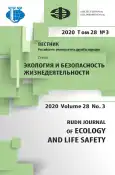Особенности накопления тяжелых металлов и мышьяка в лекарственном растительном сырье тысячелистника обыкновенного, собранного в урбо- и агробиоценозах Воронежской области
- Авторы: Дьякова Н.А.1
-
Учреждения:
- Воронежский государственный университет
- Выпуск: Том 28, № 3 (2020)
- Страницы: 213-224
- Раздел: Геоэкология
- URL: https://journal-vniispk.ru/2313-2310/article/view/323890
- DOI: https://doi.org/10.22363/2313-2310-2020-28-3-213-224
- ID: 323890
Цитировать
Полный текст
Аннотация
Воронежская область - один из важнейших регионов земледелия и растениеводства. Целью исследования анализ загрязнения тяжелыми металлами и мышьяком лекарственного растительного сырья на примере травы тысячелистника обыкновенного, заготовленной в различных урбо- и агроэкосистемах Воронежской области. Исследование осуществлялось по фармакопейным методикам с использованием атомно-абсорбционного спектрометра МГА-915МД. Определяли концентрации свинца, ртути, мышьяка, никеля, кадмия, меди, кобальта, цинка, хрома в 51 образце растительного сырья. Сравнение данных по содержанию изучаемых элементов в почвах региона и концентрации их в траве тысячелистника обыкновенного позволяет утверждать о наличии физиологических барьеров, препятствующих накоплению токсичных веществ в растении, что особенно заметно для свинца, кадмия, ртути, мышьяка, кобальта и хрома. Тысячелистник обыкновенный избирательно аккумулирует медь и цинк, если их содержание в окружающей среде ниже жизненно необходимого уровня. На основании проведенных исследований можно предполагать, что в условиях антропогенного воздействия на среду обитания тысячелистника обыкновенного в результате действия отбора в условиях техногенного загрязнения внешней среды и проявления адаптации к этим условиям происходит формирование его эдафотипа. Результаты исследований также показали, что имеет место значительное загрязнение травы тысячелистника обыкновенного аэрозольным путем (в частности, свинцом, кадмием, никелем, хромом, кобальтом), что необходимо учитывать при оценке качества данного вида лекарственного растительного сырья и планировании мест его заготовки.
Об авторах
Нина Алексеевна Дьякова
Воронежский государственный университет
Автор, ответственный за переписку.
Email: Ninochka_V89@mail.ru
кандидат биологических наук, доцент кафедры фармацевтической химии и фармацевтической технологии фармацевтического факультета
Российская Федерация, 394018, Воронеж, Университетская пл., д. 1Список литературы
- Dyakova NA, Slivkin AI, Gaponov SP. Comparison of features of accumulation of the basic toxic elements flowers of a linden heart-shaped and tansies ordinary. VSU Bulletin. Series: Chemistry, Biology, Pharmacy. 2017;(1):148–154. (In Russ.)
- Gosudarstvennaya farmakopeya Rossiiskoi Federatsii [State pharmacopeia of the Russian Federation] (vol. 2). 14 ed. Moscow: FEMB Publ.; 2018. (In Russ.)
- Popp YI, Bokova TI. Copper content in medicinal plants growing in the catches of the rivers Irtysh and Obi. Journal of the Oman State Agrarian University. 2016;(3):100–107. (In Russ.)
- Zaytseva MV, Kravchenko AL, Stekolnikov YA, Sotnikov VA. Heavy metals in a system the soil plant in the conditions of pollution. Scientists Notes of Oryol State University. Series: Natural, Technical and Medical Sciences. 2013;(3):190–192. (In Russ.)
- Dyakova NA. Assessment of contamination by heavy metals of upper soil layers of urban and agro-ecosystems of the Central Black Earth. Journal of the Irkutsk State Agricultural Academy. 2019;(95):19–30. (In Russ.)
- Dyakova NA, Slivkin AI, Gaponov SP. Study of accumulation of heavy metals and arsenic and assessment of the influence of pollutants on the content of flavonoids in Polygonum aviculare (Caryophyllales, Polygonaceae). Journal of Kamchatka Technical State University. 2019;(48):71–77. (In Russ.) doi: 10.17217/2079-0333-2019-48-71-77.
- Semenova IN, Singizova GS, Zulkaranaev AB, Ilbulova GS. Effects of copper and lead on plant growth and development as exemplified by Anethum graveolens L. Modern problems of science and education. 2015;(3). (In Russ.) Available from: http://science-education.ru/ru/article/view?id=19568 (accessed: 10.02.2020).
- Nemereshina ON, Gusev NF, Petrova GV, Shajhutdinova AA. Some aspects of adaptation of Polygonum aviculare L. to pollution of the soil heavy metals. News of the Orenburg State Agrarian University. 2012;1(33):230–234. (In Russ.)
- Rai A, Kulshreshtha K. Effect of particulates generated from automobile emission on some common plants. Journal of Food, Agriculture & Environment. 2006;4:253–259.
- Shigabayeva GN. Heavy metals in soils of some districts of Tyumen. Bulletin of the Tyumen State University. Ecology and Environmental Management. 2015;1(2):92–102. (In Russ.)
- Popp YI, Bokova TI. Cadmium content in medicinal plants growing in the catches of the rivers Irtysh and Obi. Journal of Krasnoyarsk State Agrarian University. 2017;(3): 105–113. (In Russ.)
- Popp YI, Bokova TI. Content of zinc, copper and cadmium in various types of medicinal plants growing in the catches of the rivers Irtysh and Obi. Journal of Novosibirsk State Agrarian University. 2017;(1):84–92. (In Russ.)
- Buszewski B, Jastrzebska A, Kowalkowski T. Monitoring of Selected Heavy Metals Uptake by Plants and Soils in the Area of Torun. Poland Polish Journal of Environmental Studies. 2000;9(6):511–515.
- Speak AF, Rothwell JJ, Lindley SJ, Smith CL. Urban particulate pollution reduction by four species of green roof vegetation in a UK city. Atmospheric Environment. 2012;61:283–293.
- Gupta GP, Kumar B, Singh S, Kulshrestha UC. Deposition and Impact of Urban Atmospheric Dust on Two Medicinal Plants during Different Seasons in NCR Delhi. Aerosol and Air Quality Research. 2016;(16):2920–2932.
Дополнительные файлы









